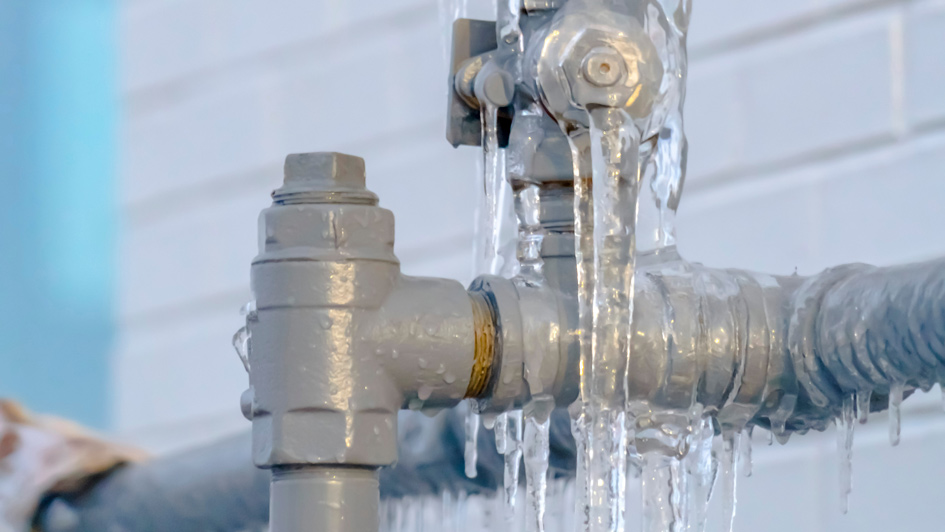
The snowy winter weather brings things like sledding down a nearby hill or snowball fights in the neighbor's yard. However, winter weather can be tough on your home. Extremely cold conditions can encourage the water lines in your home to freeze and burst, which may result in serious water damage and enduring negative effects.
Once your pipes are frozen solid, you should hire a plumber in Greater Richmond to handle the problem. However, there’s a lot you can perform on your own to keep this from happening – and even just a bit of prevention can go a long way.
What Pipes Are at More Risk of Freezing
The pipes at the greatest risk of freezing are uncovered water lines. Common locations for uninsulated pipes are inside attic crawlspaces, near exterior walls, in the basement or even running underneath a modular home. Water lines that are not correctly insulated are at the highest risk.
How to Prevent Pipes from Freezing Over in Your Home
Sufficiently insulating exposed water lines is a good first step to keeping your pipes free of ice. You’ll likely have access to most of these materials from your local plumbing company, and might also already have some somewhere in your home.
Be mindful not to cover other flammable insulation materials where they may light on fire. If you don’t feel comfortable insulating the pipes yourself, call your local plumbing services professional in Greater Richmond to handle the job.
If you do choose to insulate the pipes yourself, common insulation materials for pipes are:
- Wraps or roll insulation: Lots of plumbers, hardware stores and large retailers sell insulation – usually fiberglass, foam wraps or pipe sleeves – that you can use to cover or fit around your pipes. They are offered in different lengths and sizes to suit the needs of your home.
- Newspaper: To a decent degree, newspaper can be used for insulation. If the weather is going to get cold and you aren’t able to add insulation before then, consider covering uninsulated pipes in this.
- Towels or rags: If you miss the opportunity to add insulation and don’t have any newspaper to use, wrapping particularly vulnerable pipes with towels or clean rags as a last-ditch effort may be just enough to keep the cold air from freezing the pipes.
An additional preventative step you can try to prevent pipes from being covered in ice is to fill any cracks that can permit cold air into your home. Keep an eye on the window frames, which can let in surprisingly strong drafts. Not only should this help to keep your pipes from freezing, but it will have the added benefit of making your home more energy efficient.
Five More Ways to Keep Your Pipes from Freezing:
- Open the cabinet doors. Opening the cabinet doors underneath the sinks and other spaces of your home with pipes will allow more warm air from the rest of the room to reach the pipes.
- Letting water drip. Keeping a flow of water by letting your faucets trickle even just a little can help avoid frozen pipes.
- Open interior doors. By opening doors between rooms or hallways, your home can be heated more consistently. This is especially important if you have a room that is frequently colder or hotter than the remainder of your home.
- Close the garage door. The exception to the open doors tip is the garage door, which you should keep shut – especially if your water lines are installed under the garage.
- Keep the heat flowing. Experts suggest setting the thermostat at a uniform temperature and leaving it there, rather than permitting it to get cooler at night. Set it no colder than 55 degrees.
How to Keep Pipes from Freezing in an Empty Home
When you’re in your own home, it’s easier to realize when something isn't right. But what added steps can you take to stop pipes from freezing in an unused home or vacation home when the damage from a frozen pipe might not be discovered for days or even weeks?
As with a primary residence, adding insulation to any exposed water lines, opening interior doors inside the home and winterizing the vacant home are the basic steps to try at first.
Additional Steps to Stop Pipes from Freezing in a Vacant Home:
- Leave the heat on. Even though you aren't currently using the home, it’s best to keep the heat on – even if you switch the thermostat down colder than you would if you were there. As with a primary residence, experts suggest keeping the temperature at no cooler than 55 degrees.
- Shut water off and drain the lines. If you’re going to be gone for a long time or are winterizing a rustic cabin or cottage, shutting the water off to the house and clearing the water out of the water lines is one way to stop pipes from freezing and breaking. Remember to drain the water out of any appliances, such as the hot water heater, as well as the toilets. Make sure you get all the water from the pipes. If you’re unsure of how to drain the water from the pipes, or don’t feel comfortable performing it yourself, a plumber in Greater Richmond will be glad to offer support.
